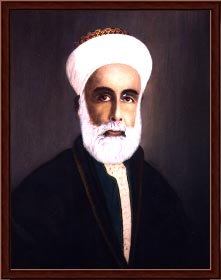 |
Sharif Hussein bin Ali (1853-1931) |
||
| Emir of Mecca and King of the Arabs, he was the last of the Hashemite Sharifians that ruled over Mecca, Medina and the Hijaz in unbroken succession from 1201 to 1925. Sharif Hussein is best known for launching the Great Arab Revolt in June 1916 against the Ottoman army. During the First World War, the Turkish dominated Ottoman Empire sided with the Central Powers against the Allies, allowing the Emir of Mecca to seize the opportunity to liberate the Arab lands from Turkish rule by allying himself with the British and the French. His objective in undertaking the Great Arab Revolt was to establish a single independent and unified Arab state stretching from Aleppo (Syria) to Aden (Yemen), based on the ancient traditions and culture of the Arab people, the upholding of Islamic ideals and the full protection and inclusion of ethnic religious minorities. Arab nationalists found in the Hashemite commanders of the Great Arab Revolt the leadership that could realize their aspirations, and thus coalesced around them. Sharif Hussein’s sons Emir Ali, Emir Abdullah (King Hussein’s grandfather), Emir Faisal and Emir Zeid’s forces led the Arab Army against the Turks. While the colonial powers of Britain and France denied the Arabs their promised single unified Arab state, it is nevertheless testimony to the effectiveness of the Great Arab Revolt that the Hashemite family secured Arab rule over all of modern Jordan, most of the Arabian peninsula and Syria. |
|||